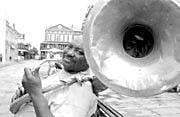Holocaust survivor wants to jam with Tuba Skinny; due to coronavirus, they improvise
New Orleans band records from afar for Brussels pianist, a fan
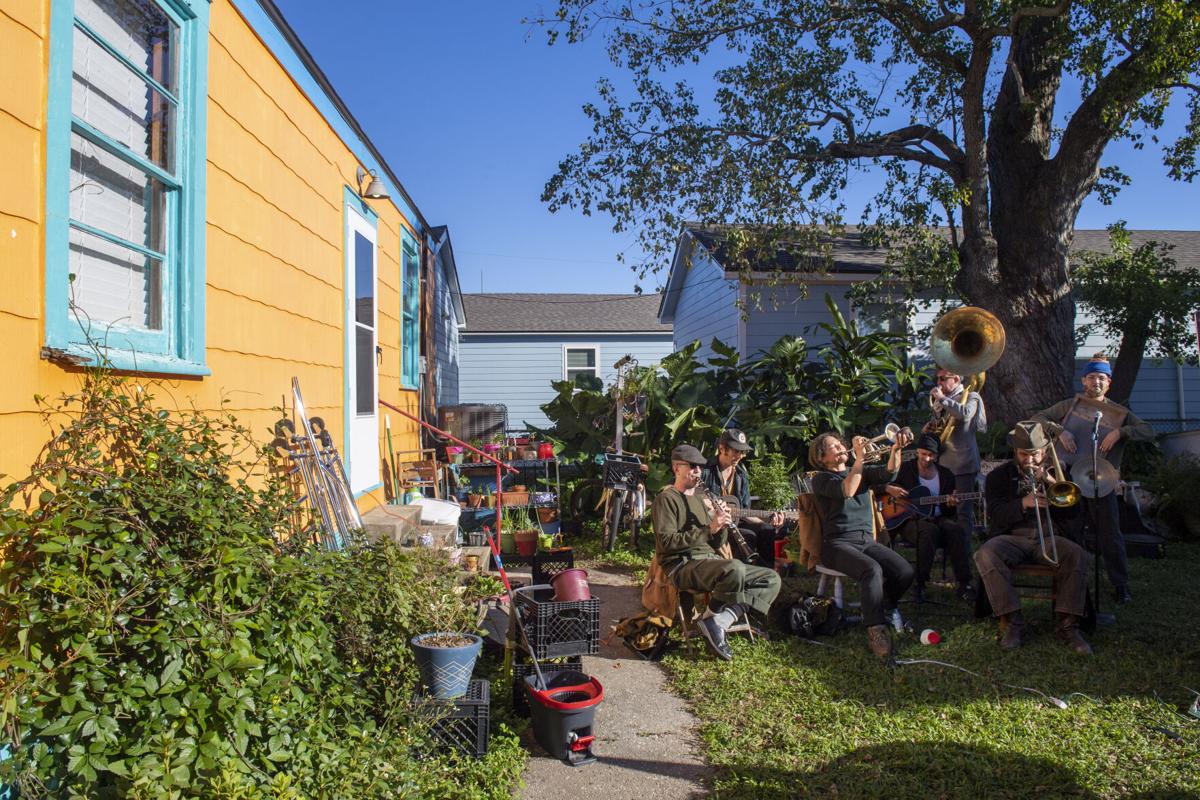
The traditional jazz band Tuba Skinny records songs in a New Orleans backyard for Simon Gronowski, a Holocaust survivor living in Brussels, on Tuesday, December 1, 2020. Because of the coronavirus pandemic the musicians arenÕt able to travel to play in person with Gronowoski. (Photo by Chris Granger | The Times-Picayune | The New Orleans Advocate)
- PHOTO BY CHRIS GRANGER
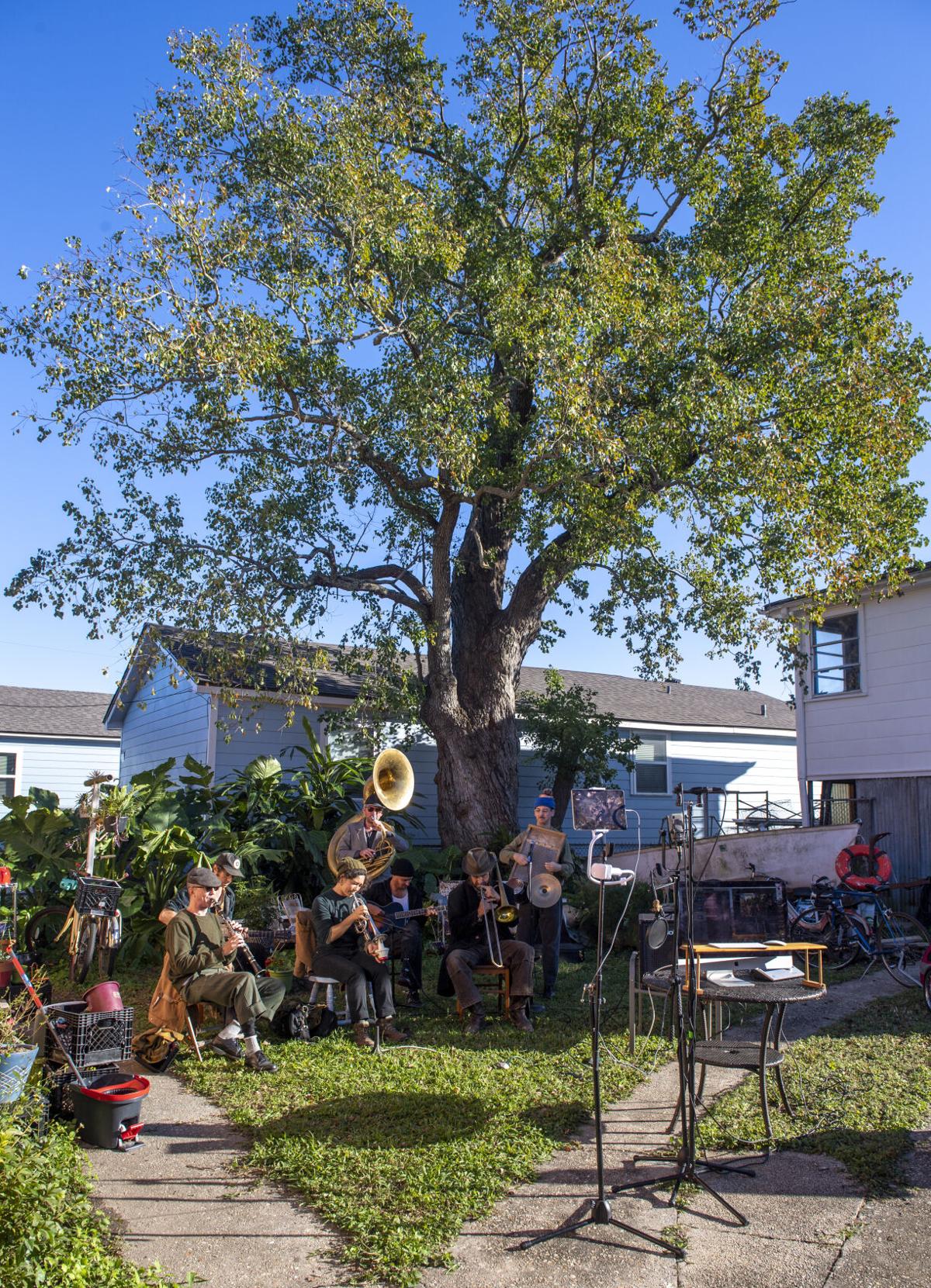
The traditional jazz band Tuba Skinny records songs in a New Orleans backyard for Simon Gronowski, a Holocaust survivor living in Brussels, on Tuesday, December 1, 2020. Because of the coronavirus pandemic the musicians arenÕt able to travel to play in person with Gronowoski. (Photo by Chris Granger | The Times-Picayune | The New Orleans Advocate)
- PHOTO BY CHRIS GRANGER
Barnabus Jones, a trombone player with the traditional jazz band Tuba Skinny, plays in a New Orleans backyard as the group records songs for Simon Gronowski, a Holocaust survivor living in Brussels, on Tuesday, December 1, 2020. Because of the coronavirus pandemic the musicians arenÕt able to travel to play in person with Gronowoski. (Photo by Chris Granger | The Times-Picayune | The New Orleans Advocate)
- PHOTO BY CHRIS GRANGER
Cornet player Shaye Cohn looks down at her sheet music as she and her bandmates prepare to record songs for Simon Gronowski, a Holocaust survivor living in Brussels, on Tuesday, December 1, 2020. Because of the coronavirus pandemic the musicians arenÕt able to travel to play in person with Gronowoski. (Photo by Chris Granger | The Times-Picayune | The New Orleans Advocate)
- PHOTO BY CHRIS GRANGER
The traditional jazz band Tuba Skinny takes a break from recording in a New Orleans backyard for Simon Gronowski, a Holocaust survivor living in Brussels, on Tuesday, December 1, 2020. Because of the coronavirus pandemic the musicians arenÕt able to travel to play in person with Gronowoski. (Photo by Chris Granger | The Times-Picayune | The New Orleans Advocate)
- PHOTO BY CHRIS GRANGER
The traditional jazz band Tuba Skinny records songs for Simon Gronowski, a Holocaust survivor living in Brussels, on Tuesday, December 1, 2020. Because of the coronavirus pandemic the musicians arenÕt able to travel to play in person with Gronowoski. (Photo by Chris Granger | The Times-Picayune
Recording equipment in a New Orleans back yard records Tuba Skinny as they record some traditional jazz songs for Simon Gronowski, a Holocaust survivor living in Brussels, on Tuesday, December 1, 2020. Because of the coronavirus pandemic the musicians arenÕt able to travel to play in person with Gronowoski. (Photo by Chris Granger | The Times-Picayune | The New Orleans Advocate
Barnabus Jones, a trombone player with the traditional jazz band Tuba Skinny, warms up in a New Orleans backyard as they band gathers to record songs for Simon Gronowski, a Holocaust survivor living in Brussels, on Tuesday, December 1, 2020. Because of the coronavirus pandemic the musicians arenÕt able to travel to play in person with Gronowoski. (Photo by Chris Granger | The Times-Picayune | The New Orleans Advocate
Childhood Holocaust survivor Simon Gronowski recounts how he jumped from a train boxcar that was leading his family to a death camp, during a talk at the Los Angeles Holocaust Museum memorial on April 15, 2018. (Photo by Damian Dovarganes, The Associated Press)
Trombonist Barnabus Jones, 41, could have stepped into this 9th Ward backyard during another century, with his mutton-chop sideburns, fedora and style of horn playing. His bandmates in Tuba Skinny are similarly timeless, as is their music, a broad repertoire of old-time jazz and blues that they play ensemble-style.
“Because of improvisation, people play off each other,” Jones said. “How we play is based on who we’re playing with.”
But for Tuesday’s performance, in a backyard on New Orleans’ Urquhart Street, the seven musicians were vibing partly to one another and partly to the imagined rhythms of someone unseen, an 89-year-old Belgian pianist named Simon Gronowski.
“Hey, Mr. Gronowski,” intoned washboard player Robin Rapuzzi, 32, as they began to record. “We’d like to play music with you, too.” Because of the COVID-19 pandemic, an in-person collaboration was perilous, he said, “but in the meantime, this is what we got.”
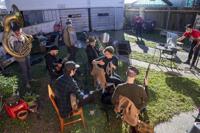
Sound engineer Russel Welch, far right, gets ready to record as cornet player Shaye Cohn, center, talks with her bandmates just before they start recording for Simon Gronowski, a Holocaust survivor living in Brussels, on Tuesday, December 1, 2020. Because of the coronavirus pandemic the musicians arenÕt able to travel to play in person with Gronowoski. (Photo by Chris Granger | The Times-Picayune | The New Orleans Advocate)
PHOTO BY CHRIS GRANGER
With that, cornet player and bandleader Shaye Cohn, 38, stomped her foot to set the beat for “Savoy Blues,” written by Louisiana trombonist and bandleader Edward “Kid” Ory in 1920.
It was one of four tunes laid down by the band on a digital sort of recording wax that flowed through a computer set up in a friend’s backyard. The technology allows other musicians to add tracks remotely, and the result will be a cohesive album even though the musicians are performing oceans apart from one another. Tuba Skinny’s former singer, Erika Lewis, who lives in North Carolina, will add vocals, and Gronowski will add his keyboard.
The seed for this collaboration was planted last month in Brussels, in a newspaper profile of Gronowski. Widely known in Europe as a Holocaust survivor, Gronowski, at age 11, had jumped off a train headed to the Auschwitz death camp that killed his mother and older sister. He wrote a book about that experience, and about his decision later to forgive a Nazi who worked as a guard in a camp where Gronowski and his family had been held.
In November, he brought up Tuba Skinny in an interview with The New York Times’ Brussels correspondent, Matina Stevis-Gridneff, who wrote a profile about him and his response to the coronavirus lockdown. Once again, Stevis-Gridneff wrote, Gronowski had moved past tragedy to hope, as he regularly opened his windows and played jazz on his electric piano for his neighbors.
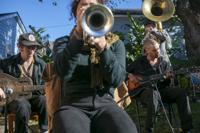
Guitarists Max Bien-Kahn, left, and Greg Sherman, right, play behind cornetist Shaye Cohn, center, as the jazz band Tuba Skinny records songs in a New Orleans backyard for Simon Gronowski, a Holocaust survivor living in Brussels, on Tuesday, December 1, 2020. Because of the coronavirus pandemic the musicians arenÕt able to travel to play in person with Gronowoski. (Photo by Chris Granger | The Times-Picayune | The New Orleans Advocate)
PHOTO BY CHRIS GRANGER
Amy Edwards Anderson, an English teacher who has lived near Gronowski in Brussels for two decades, told The Times that the music was “a kind of unsolicited gift to the neighborhood.”
Gronowski said he was making plans for after the lockdown. “I want to play with this band from New Orleans,” he told The Times. “They’re called Tuba Skinny. They’re great!”
After the story was published, members of Tuba Skinny started getting a flood of phone calls. A few people offered to fly Gronowski to New Orleans or to fly the band to him. The band demurred, given the risks of the pandemic’s burgeoning third wave. But a digital recording session seemed feasible.
“I love Tuba Skinny because their jazz is pure and wonderful and because they’re young, sincere and simple,” Gronowski told The Times-Picayune | The New Orleans Advocate, in messages translated from French by Anderson. He wrote that he’d never been to New Orleans to see the band but had heard its music on jazz radio and on the internet. “Jazz brings people together and brings them happiness,” he wrote of the collaboration he’d wrought with the little band from New Orleans.
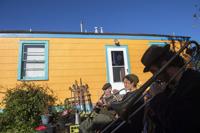
It was perfect weather for the traditional jazz band Tuba Skinny to record songs in a New Orleans backyard for Simon Gronowski, a Holocaust survivor living in Brussels, on Tuesday, December 1, 2020. Because of the coronavirus pandemic the musicians arenÕt able to travel to play in person with Gronowoski. (Photo by Chris Granger | The Times-Picayune | The New Orleans Advocate)
PHOTO BY CHRIS GRANGER
The socially distanced recording Tuesday afternoon was augmented occasionally by the sounds of the 9th Ward, where a neighbor was hammering in an adjacent yard and a bird sang from the Chinese-tallow tree. Beneath its canopy, band members were seated on portable chairs next to a mildewed fishing boat on blocks and a clawfoot bathtub.
On occasion, clarinetist Craig Flory, 62, and Cohn would put down their horns and Cohn would holler “Gronowski!” to signal a future 12-bar solo for their invisible piano player. During those moments, the band scaled back to rhythm section only: Rapuzzi on washboard, guitarists Greg Sherman, 32, and Max Bien-Kahn, 34, and Todd Burdick, 36, on sousaphone.
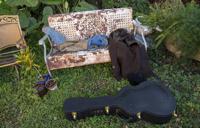
Jackets and instrument cases strewn across a New Orleans backyard as Tuba Skinny, a traditional jazz street band, records songs for Simon Gronowski, a Holocaust survivor living in Brussels, on Tuesday, December 1, 2020. Members of the band said they hope to one day play in person with Gronowski when itÕs safer after the coronavirus pandemic. (Photo by Chris Granger | The Times-Picayune | The New Orleans Advocate)
PHOTO BY CHRIS GRANGER
The band’s name came from Burdick, who, when riding his bicycle to the French Quarter, every time heard a man holler, “There goes Tuba Skinny,” a wry reference to longtime street musician Anthony “Tuba Fats” Lacen, who died in 2004 and laid in state at Gallier Hall until his funeral and procession.
Tuba Skinny’s “stage” of many years, the pedestrian mall made by a blocked-off Royal Street, went away when the Hard Rock Hotel fell and Royal was reopened to vehicular traffic. But on Tuesday, the band again put its music into the air of New Orleans. And, as with Gronowski in Brussels, neighbors saw it as an unsolicited gift.
As they played their versions of “Squeeze Me,” the 1925 Fats Waller tune and the Ma Rainey number “Hear Me Talkin’ to Ya,” applause came from the other side of a wooden fence. Standing on tiptoes, a neighbor showed her smiling face and told the band that their music had brightened her day. “Thank you. Thank you,” she said.


